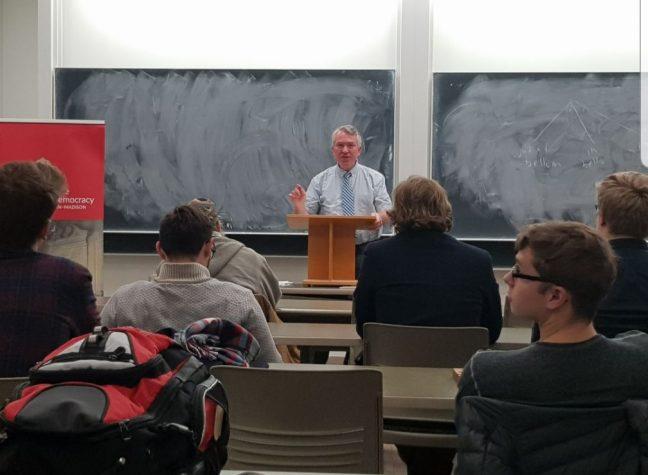The Tom Sawyer Society hosted Baylor University political science professor David Corey Wednesday to lecture on the “just war” tradition.
The tradition says there can be clear cut answers to whether occurrences in war are morally just, Corey said. For instance, the killing of innocent civilians can be considered just under the tradition if certain criteria are met.
Corey said there exists a sense of ambiguity in moral situations that simply do not have a black-and-white, right or wrong answer.
“I want to accuse the just war tradition of hiding certain ambiguities about justice in war — of obscuring them,” Corey said.
Expanding on this, Corey said it is inappropriate to ask the simple question of whether a war is just because justice in war can be considered in three different fundamental regards.
Whether the cause of going to war is just, the morality of the actions that take place within the war itself, and what was done after the war — whether that was promoting justice or not — have to be considered, Corey said. Respectively, these three concepts are referred to as “jus ad bellum” (Latin for “right to war”), “jus in bellum” (the law of armed conflict), and “post bellum” (meaning after the war). All three must be carefully broken down before a conclusion can be made.
“If I was asked if a war was just, I would ask if you mean ad bellum, in bellum or post-bellum,” Corey said.
By dividing justice in war into three parts, the just war tradition forces one to contend with ambiguity. But in some instances, the tradition is still obscured, Corey said.
“What I argue is that what appears just in one vantage point appears unjust from another … The pursuit of justice frequently entails injustice,” Corey said.
The absence of ambiguity in the tradition is not a defect, but rather something fundamental about the status of justice in human affairs in general, Corey said.
The pursuit of justice can never be deemed unequivocally good, unlike what the just war tradition can imply, Corey said.
“How can a war be just if it entails the killing of innocent people, an injustice in its own right, caused by ostensibly just agents, who often are completely aware of what they are doing?” Corey asked.
The “doctrine of double effect,” as explained by the just war tradition, has an answer to this. If a bombardier happens to accidentally kill innocent civilians while successfully killing the target, the act is considered just if it meets three conditions, Corey said.
First, the act has to be considered morally right, independent of its evil effects. Second, the agent must intend the good and not the evil. Third, the agent must have proportionally grave reasons for acting. With these three conditions met, the act can be considered unequivocally just, Corey said.
But at the end of the day, innocent lives are lost, which raises questions of how that could be just. The answer lies in intention, which can be difficult to determine.
“A true and perfect understanding of these difficult [moral] concepts is simply not to be had here on earth,” Corey said, quoting Plato.


